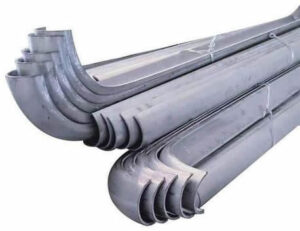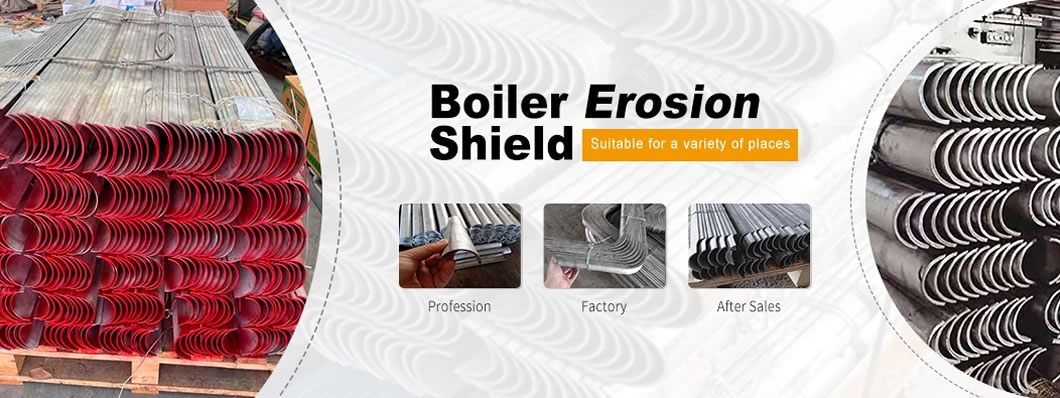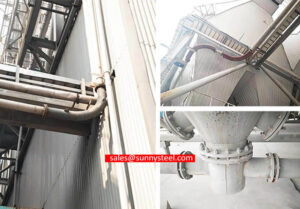Our team is highly trained and experienced in servicing and producing all types of steel supplies. Need help or have a question?
sales@abrasionresistantpipe.com
Tel.: +8621-3378-0199
Our team is highly trained and experienced in servicing and producing all types of steel supplies. Need help or have a question?
sales@abrasionresistantpipe.com
Tel.: +8621-3378-0199

310S stainless snap rings are used in conjunction with boiler tube erosion shields, which is a clip that easily installs boiler tube erosion shields to the tube.
310s stainless snap rings are used in conjunction with boiler tube erosion shields, which is a clip that easily installs boiler tube erosion shields to the tube.
304 Stainless is a low carbon (0.08% max) version of basic 18-8 also known as 302. Type 302 has 18% chromium and 8% nickel.
ASTM A213 TP304 Stainless Steel Seamless Tube is manufactured by seamless process used in high pressure environment, stainless steel TP304 grade is the most used material due to its high strength and excellent corrosion resistance.

The snap ring and boiler tube erosion shields are overlapped and welded, generally about 190-200 degrees erosion shields is a 180-degree semicircle), but also leave a welding position for easy welding and fixing. Generally, each piece of boiler tube erosion shields needs to be equipped with 2-4 snap rings with a pitch of 200-500mm.
The anti-wear snap ring is also called a clamp, buckle, tube clamp, etc.
The main role of the anti-wear tile snap ring: the role of fixing the anti-wear tile to avoid problems such as the anti-wear tile falling off during installation.
The types of common anti-wear tile rings can be divided into: u-shaped lap type snap ring, butt-type semicircular snap ring.


What is the difference between 310 and 310S?
Type 310S Stainless Steel is identical to Type 310 except for a lower carbon content that minimizes carbide precipitation and improves weldability. They are essentially nonmagnetic as annealed and become lightly magnetic when cold worked.
Applications of Grade 310/310S Stainless Steel
Typical Applications Grade 310/310S is used in fluidised bed combustors, kilns, radiant tubes, tube hangers for petroleum refining and steam boilers, coal gasifier internal components, lead pots, thermowells, refractory anchor bolts, burners and combustion chambers, retorts, muffles, annealing covers, saggers, food processing equipment, cryogenic structures.
If it is likely to be an issue, discussion with the producer can be valuable as minor variations to the precise composition and process can have benefits.
Grade 310/310S is used in fluidised bed combustors, kilns, radiant tubes, tube hangers for petroleum refining and steam boilers, coal gasifier internal components, lead pots, thermowells, refractory anchor bolts, burners and combustion chambers, retorts, muffles, annealing covers, saggers, food processing equipment, cryogenic structures.
| Grade | C | Mn | Si | P | S | Cr | Mo | Ni | Fe |
|---|---|---|---|---|---|---|---|---|---|
| SS 310 | 0.015 max | 2.0 max | 0.15 max | 0.020 max | 0.015 max | 24.00 – 26.00 | 0.10 max | 19.00 – 21.00 | 54.7 min |
| SS 310S | 0.08 max | 2.0 max | 1.00 max | 0.045 max | 0.030 max | 24.00 – 26.00 | 0.75 max | 19.00 – 21.00 | 53.095 min |
| Density | Melting Point | Tensile Strength | Yield Strength (0.2%Offset) | Elongation |
|---|---|---|---|---|
| 7.9 g/cm3 | 1402 °C (2555 °F) | Psi – 75000 , MPa – 515 | Psi – 30000 , MPa – 205 | 0.4 |
Alloy 310 is an austenitic stainless steel that combines excellent high temperature properties with good ductility and weldability. It is typically used for elevated temperature applications as its high chromium and nickel content provide solid corrosion resistance, excellent resistance to oxidation, and superior strength in temperatures up to 2100°F. Due to its high chromium and nickel content, it is superior to 304 or 309 stainless in most environments.
The higher alloyed stainless steels generally have excellent strength at elevated temperatures along with outstanding resistance to creep deformation and environmental attack. Therefore, Alloy 310 is used widely in industries such as heat treatment and chemical processing. Some examples include:
Where heavy sections have to we welded, post-weld annealing may be necessary to restore corrosion resistance.
The cross-sectional shape of boiler tube erosion shields is mostly semi-circular (180 degrees), and there are also 120-160 degrees. It is mainly used on finned tubes (water-cooled walls); boiler tubes erosion shields are divided into direct wear-resistant shields, in-curve anti-wear shields, outer-curve anti-wear shields, side-curve anti-wear shields, s-curve anti-wear shields, etc. The length of the straight anti-wear shields ranges from 20mm to 3000mm, and the general length of 1000-2000mm is commonly used. The anti-wear shields with bends generally requires a processing, drawing and the following parameters should be on the drawing: outer diameter of the pipe used, bending of the pipe radius r (to the centre of the pipe), the degree of bending angle, and the length of the straight sections on both sides of the arc segment of the wear-resistant shields.
The most basic parameter of boiler tube erosion shields is the outer diameter of the tube used (that is, the inner diameter of boiler tubes erosion shields). The main specifications of the tube are: 32, 38, 42, 44.5, 48, 51, 57, 60, 63.5 , 76, 89mm, etc .; the inner diameter of the boiler tubes erosion shields is usually 1-3mm larger than the outer diameter of the tube used, depending on the actual requirements.
 Install erosion shields with snap ring
Install erosion shields with snap ringThe snap ring is a short section that is installed on the pipe in conjunction with the wear-resistant tile. Generally, it is welded to the wear-resistant tile by lap welding, that is, to cover the wear-resistant tile slightly, so it is larger than the wear-resistant tile. The opening arc is around 190-200 degrees, the welding position needs to be set aside to facilitate welding and fixing. The width of the snap ring must not be less than 20mm.
The installation requirements of anti-friction tiles of different shapes are slightly different. Basically, each anti-friction tile is installed with not less than 2-4 snap rings. The snap ring and the anti-friction tile are welded together to prevent expansion due to heat. The tiles fall off, and the joints are required to be fully welded.
Tube shields are custom made to fit perfectly to straight sections, curved sections and even finned and specialised tubing.

Boiler tube erosion shields, also known as anti-corrosion shields, anti-wear plate, anti-wear protection shields, anti-wear cover plate, anti-corrosion cover plate, boiler climbing pipe, anti-wear pressure plate, etc. , which are used in combination with snap rings.
Boiler tube erosion shields are produced using a high-pressure press and professional mould pressing. The production time is short, the welding performance is good, the welding should not fall off, the surface is smooth, and the appearance is beautiful. Boiler tube erosion shields with bends are formed by pressing on a press or bending with a special abrasive on a tube bender.
Boiler tube shields are designed to eliminate major maintenance and downtime costs from boiler and condenser tube failure.
 Different types of stainless steel are selected according to the specific conditions of different working conditions. Common materials are: TP321 (Cr18Ni9Ti), TP309S (Cr23Ni13), 1Cr20Ni14Si2, TP310S (Cr25Ni20), 1Cr25Ni20Si2, and some low temperature areas (such as low temperature superheater, low temperature reheater) are made of 1Cr13, 1Cr6Si2Mo and other materials.
Different types of stainless steel are selected according to the specific conditions of different working conditions. Common materials are: TP321 (Cr18Ni9Ti), TP309S (Cr23Ni13), 1Cr20Ni14Si2, TP310S (Cr25Ni20), 1Cr25Ni20Si2, and some low temperature areas (such as low temperature superheater, low temperature reheater) are made of 1Cr13, 1Cr6Si2Mo and other materials.
The boiler was originally designed to be accurate. Different materials have different temperature resistance and mechanical strength. 1Cr13, 1Cr6Si2Mo generally has a temperature resistance of 600 ℃ or less.
| Material(Grade) | Temperature resistance | Yield strength | Tensile strength | Elongation | HB | HRB | HV |
|---|---|---|---|---|---|---|---|
| 1Cr18Ni9Ti | 925 ℃ | ≥205MPa | ≥520MPa | ≥40% | ≤187 | ≤90 | ≤200 |
| Cr23Ni13 | 1095 ℃ | ≥205MPa | ≥520MPa | ≥40% | ≤187 | ≤90 | ≤200 |
| 1Cr20Ni14Si2 | 1095 ℃ | --- | ≥590MPa | ≥40% | --- | --- | --- |
| Cr25Ni20 | 1150 ℃ | ≥205MPa | ≥520MPa | ≥40% | ≤187 | ≤90 | ≤200 |
| 1Cr25Ni20Si2 | 1150 ℃ | --- | ≥540MPa | ≥35% | --- | --- | --- |

Tube erosion shields are mainly used on the windward side of the heating surface of the boiler, such as superheaters, reheaters, economizers, and water-cooled wall pipes. The main role is to protect the heating surface of the boiler pipes, reduce pipeline wear, and increase the heating surface of the pipes.

Erosion shields are used to protect boiler tubing from the highly erosive effects of high temperatures and pressures thereby greatly extending tube life.
We offer shielding for tubing, covering straight, bent and finned sections, as well as the clips that hold these in place.
In the long term, these shields more than pay for themselves, preventing the costly replacement of tubing and avoiding the downtime that results from tube breakdown and leaks.
In general, most of them are called “wear-resistant tile” and “wear-resistant cover plate”. Erosion Shields are special boiler accessories.
Generally, most of them are used in power station boilers, small boilers are used less, and some coal chemical industries will also use them.
Need to inquire about our products? Fill out the form below and our staff will be in touch!
Q: How long is your delivery time?
A: The delivery time of customized products is generally 25 35 days, and non customized products are generally shipped within 24 hours after payment.
Q: Do you provide samples? Is it free?
A: If the value of the sample is low, we will provide it for free, but the freight needs to be paid by the customer. But for some high value samples, we need to charge a fee.
Q: What are your payment terms?
A: T/T 30% as the deposit,The balance payment is paid in full before shipment
Q: What is the packaging and transportation form?
A: Non steaming wooden box and iron frame packaging. Special packaging is available according to customer needs. The transportation is mainly by sea.
Q: What is your minimum order quantity?
A: There is no minimum order quantity requirement. Customized products are tailor made according to the drawings provided by the customer.